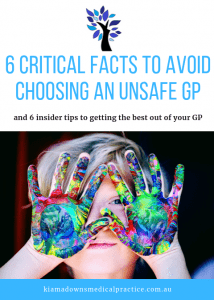Welcome to our free exclusive report

1. Get a Good Listener
For that ‘golden minute’ when you first walk in, your GP should be hanging on your every word.
Research shows this is really important for helping solve problems. Your GP should not rush to print scripts, referrals or check their phone or watch.
Tip: if you think your GP missed the point, tell them. A good GP can handle constructive feedback just as well as praise.
2. Your GP must want to know your story
Fatal errors and devastating mistakes are made when you regularly get care with a GP that doesn’t know you.
Everything is important from your parent’s medical history to your work and hobbies. If your parent had heart problems or cancer at a young age, you might qualify for early testing – which might help a GP find it just in time. Kids who have had many ear infections or who snore might have hearing or sleep issues which can lead to learning delays – if your GP knows about these issues they might help you look into and get on top of these issues before this happens.
Tip: test your GP (sneakily!) by asking for a print out of your health summary “for your records”. See what is missing. If you love your GP and want to stay with them tell them what is missing and help them get your story right to help keep you safe.
3. Good GPs dedicate proper time to meeting you
30 minutes is an ideal amount of time to meet your GP the first time.
GPs who only try to “fix the problem” will miss your whole story. Your first GP meeting should help you with your problem. A holistic GP will also listen to your whole story and do a proper health check up.
Tip: only leave your GP’s office once you have a plan for tackling all your health problems. If you feel unsure ask them to explain the plan before you leave. This is critical for your safety and in getting value for your time and money.
4. Make sure your GP respects your time
A late GP is annoying, but having a GP push you out the door after 6 minutes is infuriating and often dangerous.
Good GPs know you have taken hours or sometimes a whole day off your work or family life to see them. Your GP should go the extra mile to help you get things done.
Tip: if your GP seems to rush when you talk to them ask if they have longer appointments so you can get your problems checked properly.
5. Good mechanics and good GPs have a lot in common
Good GPs should:
- give tips and tricks on safely sorting out smaller problems yourself (like colds)
- tell you about signs to look for that might be dangerous
- give you plans for when you get sick (like asthma or allergic reactions)
- give you a plan about how to avoid problems in the future (like cancer checks or heart checks)
Your GP should know what you want and help you be as healthy as you can be. They should be helping you enjoy life without having to see them too often.
Tip: if your GP hasn’t helped you make a plan for your health, ask them to help you build one. This plan should get you and your GP to target the things you want to improve
6. Don’t just pick a great GP. Pick a practice full of them
Great GPs work in great teams. Sounds corny but it’s true
We believe the best GP practice should only have great GPs. If your usual GP is away you should be able to expect the same high standards and safety with whichever GP who you see.
Tip: there’s no point having a great GP if they are the only person you trust when you’re sick. Make Your GP the one who works in a practice full of Great GPs
Thanks for reading our free report
To learn more about our Nursing and Reception team or about our Independent GPs and GPs in training please click here.
To make a booking please click the button below.
Best wishes,
The Kiama Downs Medical Practice team
We hope you enjoyed or Exclusive Insiders report on how to pick a great Shell cove GP, the best Albion Park GP, an excellent kids Shellharbour GP, Kiama GP, a women’s Kiama Medical GP surgery or medical centre GP in Kiama

